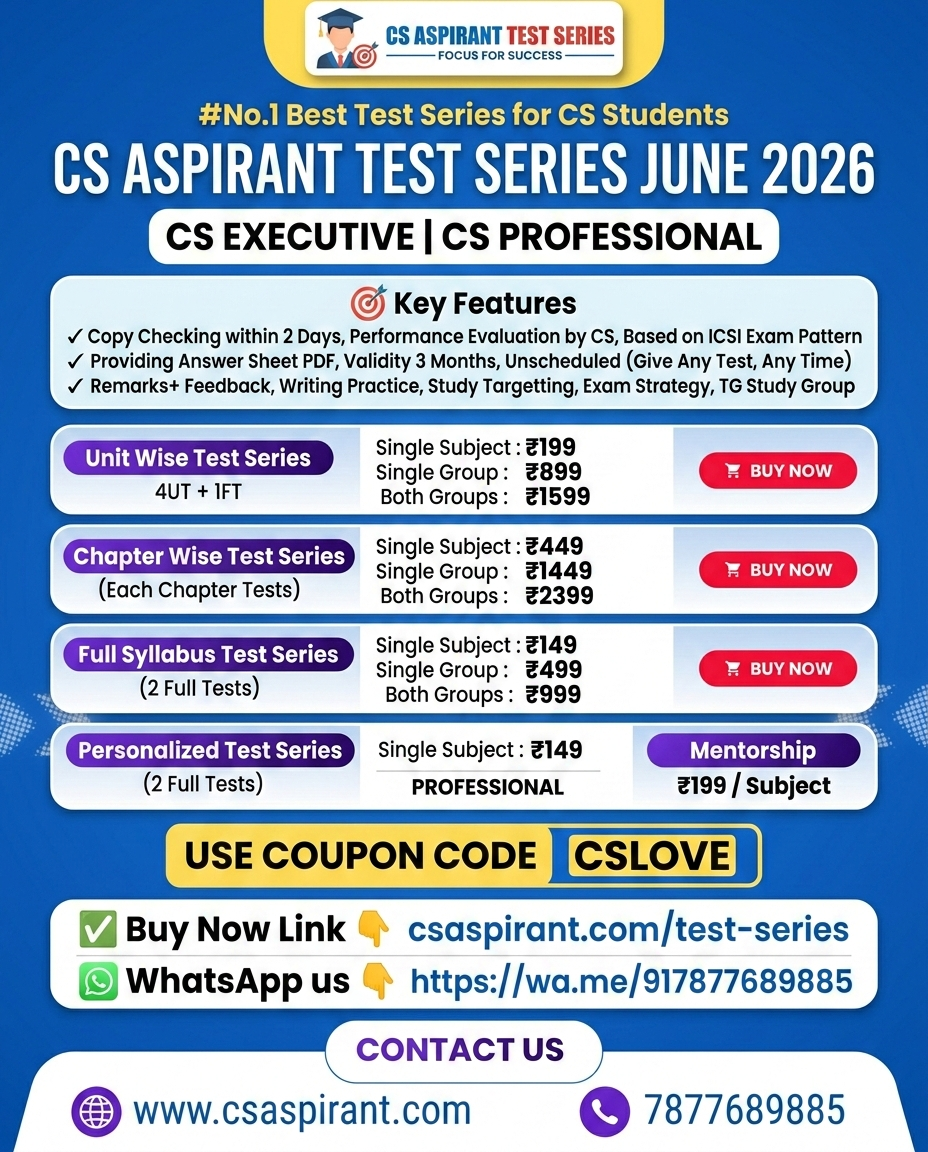CS Professional GRMCE Weightage Chapter Wise
- May 31, 2023
- 4 min read
GRMCE Chapter Wise Weightage Marks
PART A
Chapter 1
Conceptual Framework of
Corporate Governance
Question Type - Direct
Previous Year – 0 Marks
Anticipation – 5 marks
Important concepts
a. Corporate Governance Evolution and need for corporate Governance
b. OECD Principles
c. Sarbanes Oxley Act, 2002
d. Stewardship code, 2020 UK
e. Corporate Governance in Indian Ethos
f. 8 Central Principles of Corporate Governance, Australia – 2019
Chapter 2
Legislative Framework of
Corporate Governance
Question Type - Case base
Previous Year – 3 Marks
Anticipation – 5 marks
Important
a. Basel Committee on Corporate Governance
b. RBI (Fit and Proper Criteria) for Directors on the Board
c. Guidelines for corporate Governance for NBFCs
d. Mandatory Committees for Insurance Companies
e. Stewardship code for insurers in India
f. Guidelines on CSR and sustainability for CPSEs
Chapter 2
Legislative Framework of
Corporate Governance
Question Type - Case base
Previous Year – 3 Marks
Anticipation – 5 marks
Important
a. Basel Committee on Corporate Governance
b. RBI (Fit and Proper Criteria) for Directors on the Board
c. Guidelines for corporate Governance for NBFCs
d. Mandatory Committees for Insurance Companies
e. Stewardship code for insurers in India
f. Guidelines on CSR and sustainability for CPSEs
Chapter 3
Board Effectiveness
Question Type - Direct
Previous Year – 0 Marks
Anticipation – 5 to 10 marks
Important concepts
a. Board Composition
b. Restrictions on the power of the board
c. Independent Directors, Duties and the process of appointment
d. Relationship of Board and Executive Management
e. Appointment of Lead Independent Director
f. Separation of Chairman and CEO
g. Succession Planning
h. Board Evaluation framework
Chapter 4
Board Processes through
Secretarial Standards
Question Type - Case Base or Direct
Previous Year – 0 Marks
Anticipation – 0 to 5 marks
Important
a. Passing of resolution by circulation and matters which shall not be dealt
by Circulation
b. Meeting of Board through Video Conferencing
Chapter 5
Board Committees
Question Type - Direct
Previous Year – 21 Marks
Anticipation – 10 marks
Important concepts
a. All the mandatory committees
Chapter 6
Corporate Policies and
Disclosures
Question Type - Direct
Previous Year – 0 Marks
Anticipation – 5 marks
Important
a. Disclosure requirement under Companies Act, 2013
b. Disclosure requirement under SEBI(ICDR), 2019
c. Initial Disclosure and continual disclosure
d. Website Disclosures
e. Disclosure of Material Events and Disclosures of events upon application
of Materiality Guidelines
f. Contents of Management Discussion and Analysis report
g. Principles of Fair Disclosure
Chapter 7
Accounting and Audit
related issues
Question Type - Direct
Previous Year – 10 Marks
Anticipation – 5 Marks to 10 Marks
Important concepts
a. Auditor’s Independence and the services which are prohibited to be done
by the auditor
b. Internal Audit
c. NFRA – Its Power and Functions
d. Approval Process of Related Party Transaction
e. Types of Whistle Blowers
Chapter 8
Corporate Governance and
Shareholders
Question Type - Direct
Previous Year – 10 Marks
Anticipation – 5 to 10 marks
Important
a. Promoter and the roles and Liabilities of promoter
b. Investor education and protection fund
c. OECDs measures to protect the interest of Minority shareholders
d. Institutional Investor’s Role in promoting good corporate governance
e. PRI Principles
f. CRISA
g. CALPERS
h. Proxy Advisory Firms
i. Corporate Governance in Family-Owned Companies
Chapter 9
Corporate Governance and
other stakeholders
Question Type - Direct
Previous Year – 8 Marks
Anticipation – 0 to 4 Marks
Important concepts
a. Corporate Governance in South Africa (King IV Report)
b. German Corporate Governance (any 8 to 10 Principles)
c. Japanese Code (Any single segment may be asked)
d. Stakeholder Engagement (Steps and Principles)
e. Better engagement of stakeholders leads to better governance (Subjective
question may be asked)
f. Caux Round Table (Very Important)
g. Clarkson Principles of Stakeholder Engagement
Chapter 10
Governance and Compliance Risk
Previous Year – 0 Marks
Anticipation – 3 to 4 marks
Important
a. Elements of effective Governance Program
b. Compliance Risk Management and its steps
c. Compliance Risk Mitigation
d. Essentials of Compliance Risk management Program
e. What are the various risks associated with non-compliance
PART B
Chapter 12
Risk Management
Question Type - Direct
Previous Year – 20 (All Mandatory Questions)
Anticipation – 20 marks
Important
Note: This is the most Important Chapter, do it thoroughly
a. Classification of Risk (They might give you a situation to identify the
risk falls under which classification)
b. Types of Financial Risk (any 5) (Market Risk Mandatory)
c. Types of Non-Financial Risk
d. Process of Risk identification
e. Essentials of Risk Identification
f. What all threats are identified under the Risk Analysis
g. Calculate Risk Value
h. Process of Risk Analysis
i. 5 Risk mitigating Strategy (Same as Handling of Risk)
j. Role of Company Secretary in Risk Management
k. Short Note on Risk Governance
l. Components of ERM (Asked in previous year) and its Limitation
m. ISO 31000
n. SRM
PART C
Chapter 13
Internal Control
(Alternate Questions would be given)
Question Type - Direct/Case
Previous Year – 15 Marks
Anticipation – 10 marks
Important
a. Internal Control and its classification and Elements
b. Components of Internal Control by COSO
c. Internal Check
d. Internal Audit
e. Role of Audit committee and review of Information by Audit Committee
Chapter 14
Reporting
Question Type - Direct
Previous Year – 25 Marks (With alternate Questions)
Anticipation – 10 marks
Important
a. Financial Reporting – Objectives and Importance
b. Non-Financial Reporting – Board Report and Sustainability Reporting
c. Key Drivers of Sustainability Reporting
d. GRI Standards
e. Benefits and Challenges to Sustainability Reporting
f. Short note on Integrated Reporting and its guiding principles
g. Six Capital Disclosures
Credit - Adv. Chirag Chotrani
Yes Academy

